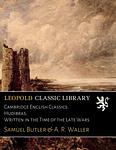Samuel Butler
Samuel Butler was a 19th-century English author, best known for his satirical novel 'Erewhon' and for his semi-autobiographical work 'The Way of All Flesh'. He was also a critic and a painter. His literature often reflected his interest in Darwinian thought and the role of evolution in society.
Books
This list of books are ONLY the books that have been ranked on the lists that are aggregated on this site. This is not a comprehensive list of all books by this author.
-
1. Way of All Flesh
The novel follows the life of Ernest Pontifex, from his birth in the early 19th century until his middle age, and his struggle against the restrictive morality of Victorian England. Raised in a stiflingly oppressive household by his hypocritical clergyman father and submissive mother, Ernest eventually rebels against his upbringing, leading to his imprisonment for a minor crime. Upon his release, he rejects his past life and religious beliefs, eventually finding happiness and success as a writer. The novel provides a scathing satire of Victorian-era attitudes towards religion and family life.
-
2. Erewhon
"Erewhon" is a satirical novel set in a fictional country discovered by the protagonist during his exploration. The society in this country is unusual, where illness is considered a crime, crime is treated as a disease, and machines are feared for their potential to evolve and overtake humanity. The book uses this bizarre world to critique various aspects of Victorian society, including religion, morality, and the industrial revolution.
-
3. Hudibras
The book in question is a satirical mock-heroic poem set during the English Civil War, which lampoons the Puritans and their attempts to impose strict religious practices on society. The narrative follows the titular character, a pompous, hypocritical knight who is more interested in appearing noble than in actual chivalry, as he embarks on various absurd and comedic adventures. Through the use of witty, dense verse and a series of humorous episodes, the poem critiques the political and religious extremism of the time, exposing the folly and pretense of those who claim moral superiority while engaging in corrupt and foolish behavior.


